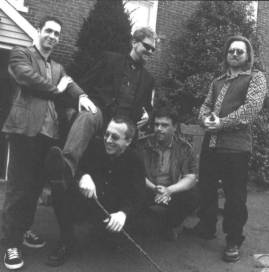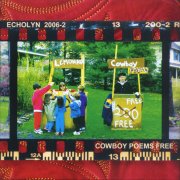Interview

(Progressive Newsletter Nr.32 10/00)
excerpts from an interview with Chris Buzby (Keyboards), Brett Kull (Guitar, Vocals) + Jordan Perlson (Drums)
Chris: I called Brett and wanted to see if he still had a desire to work with me and try to create some of the musical magic we had in days gone by. We met and talked several times, Ray, Jordan and Paul came aboard, and the rest is now history!
Brett: Chris called me and wanted to write some music together. It started out as not being an echolyn album but once the music was written it would have been stupid to not call it what it was.
Was it difficult playing together again after this long time or was it more like coming home, catching immediately the old spirit?
Chris: It was definitely different at first. We were all coming from very different places and experiences from our time apart. This was a very good thing, but something I think we all needed time to get used to. Stylistically we all have different ways of writing parts and composing songs, so that always takes a special kind of patience and finesse. What we created in "cowboy poems free" is an excellent example of how those differences can complement one another and become something totally new, fresh and original.
Brett: We started jamming right away...it took a few rehearsals to pull the first tune together. You have to get by the politeness to get down to writing with people. I wouldn't call it a "home" feeling. It was just familiar in a good and bad way.
Can you tell me a little bit more about the songs of the new album e.g. the meaning of the lyrics, when were they written, personal emotions regarding the music?
Chris: Since I only wrote one song "Brittany" I can only speak from that experience. The song "Brittany" was written in memory of a great uncle of mine - Donald Barnes - who was killed just before the Battle of the Bulge in France while fighting in WWII. He is buried at Brittany Beach, and the lyrics of the song were composed from reading his letters and going his personal belongings that had been returned to his home following his death. I discovered them following my grandfathers death a year ago, and thought it would be fitting to tell his story on this album, as his life, just like every life, is one that should never be forgotten.
Brett: The lyrics are conceptual in that they are about and deal with events of 20th century America. From 1918 WWI to the 1950's suburban explosion the lyrics are distinctly Americana. Sort of John Steinbeck meets Norman Rockwell. The music is less herky-jerky... much more flowing but somehow more rhythmic. Maturity has shown me control and restraint to bring out content in the shape of a song. The heart of a song is the most important part to convey. I think if you can do that without cluttering it up with bells and whistles your on your way to becoming a better songwriter.
Jordan: "Grey Flannel Suites", "American Vacation Tune" and "Human Lottery" were all written last summer within about a 2 weeks span of time. Paul had family obligations during this time, so I just hopped behind the kit for those rehearsels/writing sessions-hence my playing of the drum set on those songs on the record. All of the tunes went through several writing and rewriting phases but were all generally written in a rehearsel or two. For instance, the basic body and vibe of Grey Flannel Suits was written probably quicker than any of the other songs on this album. One night we still had some time at the end of a rehearsal and I threw out a rhythm I had been toying around with in my head that I couldn't seem to find harmonic and melodic counterparts to. The first and second sections of "American Vacation Tune" were written that night...only 10 minutes after "Grey Flannel Suits" had been completed!

What's the meaning of the four short poems being spread over the entire album and do they have also a connection to the album title?
Chris: The poems serve as "aural pallette cleansers" and segues from certain tracks into others. They were "controlled compositions" in the sense that we limited ourselves to an approximate length and key with each one, and most were written and played fairly spontaneously in the studio.
Brett: The poems are pallette cleansers. The sorbet of the album. We put music to actual events that took place for the main 10 songs or poems, the 4 instrumental poems are events that have been forgotten, therefore no text is available.
Jordan: The Poems represent bridges and pathways from song to song. Each one was written in a specific key at a specific tempo so that it could act as a connecting track from one to the next.
In which way did you experiment with new influences, new sounds or recording techniques?
Chris: I purposely changed around my keyboard rig for this project, as I have found that that sort of change almost always pushes me and my writing/playing in new directions. Knowing I wanted to continue pushing myself with new compositional ideas in this newest version of echolyn I decided to take a decidedly "back to basics" approach with keyboards and sounds. I bought a Wurlitzer electric piano to help complement my Fender Rhodes, I got my Leslie speaker cabinet totally refurbished and bought a Hammond xk-2 keyboard to run through it, I kept my 88-key weighted piano for piano and harpsichord sounds, and added only 1 synth to my rig for solo and textural sounds to complement the organic sounds the wurly, rhodes and hammond create. I also discovered ebay last year as well, and went to town buying all kinds of other neat, obscure instruments like autoharps, dulcimers, accordians, a harmonica, a talk box, varied world percussion instruments, and pump organs to go along with the saxophones and recorders that I already play. Together they were all used in different contexts to create the textures and different sounds that went on to become "cowboy poems free."
Brett: This album is more organic. We stayed away from synthetic sounds as much as possible. We wanted to keep things pretty simple. There is also a lot of percussion throughout the album that fits in without being obvious. It was all recorded and mixed at my studio (Farmhouse).
There's a lot of energy and complexity in the music of Echolyn, but also it grooves and rocks. How do you manage to keep things balanced, tightened, having a sophisticated sound, but not sounding too overproduced?
Chris: We have always kept a musical balance in this group by listening to each other and responding to the goals of where each composition is going - rather than just writing meandering diatribes and riffs and musical noodles to nowhere. We constantly keep ourselves in check with where each song wants to go, and in terms of creating grooves and certain vibes we are constantly reminding ourselves of what we've already written and what must still be written in order to best complement all of the tracks that go together to become an album. It is a process we have always been very conscious of and we pride ourselves in the fact that it is what has kept our writing so honest and fresh.
Brett: It comes down to finding what makes a song tick. The meat and potatoes of the tune. Develop that without being frivolous and you can't go wrong. Arranging is very important. It's easy to come up with a million ideas but knowing when to stop and leave it alone is the key. My biggest beef with a lot of prog music is that by the time all the bells, whistles, tempo changes and other slight of hand tricks have been added you've lost the song to a bunch of stuff that doesn't need to be there. Put on top of that people that think they are playing really well in strange time signatures but in reality can't play in the pocket to save their life - no names will be mentioned here - and you've got another bad prog song. I'm by no means saying I am the God of guitar playing. I listen to our first two albums and cringe at the playing and singing. "As The World" was the first album I did that I can look back at and say now I have a platform to build my resume. Our producer Glenn Rosenstein took us to a new and better musical level. I learned a lot about playing in time from him. I learn every time I get in the studio and record.
Jordan: Echolyn has an extremely mature writing and musical style. The music always naturally rocks and grooves and keeps it sophisticated. The balance and tightness comes from well structured and thoughtful rehearsels - I honestly don't remember a rehearsel with Echolyn where I thought to myself "Jeez, what a waste of a night...we got nothing done!" Whereas with several other groups I've played with/for in the past and with currently, for that matter, saying something to that affect isn't all that rare.

Is it a kind of stigma for you to be connected to the progressive rock scene or do you see it more as a chance being part of a scene and finding the right audience for your music?
Chris: It can sometimes be quite stigmatic to be so locked to the progressive music scene, although it is the listeners of progressive who have, and continue, to support us the most. Personally, what I would like to do is to try and help progressive rock lose some of its negative stigmas and actually make some headway into becoming more acepted or listened to by the listeners of the world - especially those listeners who buy into commercial music cimply because they are totally dependent on paid advertising as their only means to discover what they "think" they should be listening to. Unfortunately when you have the majority of business and commercial culture working against you that can a difficult, constant, uphill battle.
Brett: I love listening to music that is progressive...new, inventive, left of center, quirky. I look at the word progressive as a "verb" when describing a style of music not a "noun." As far as what seems to be the general definition of "Prog" music that I have seen, I want nothing to do with it.
Jordan: There are stigmas that go along with any type of music, positive or negative, no matter what style you are talking about. I believe stigma-wise, "Cowboy Poems Free" doesn't fall so obviously under the progressive rock genre but could and does fall under several others. Of course, due to the simple fact the album says "Echolyn" on it, many will assume it's a progressive album...and that's fine, just as long as everyone is open to whatever else it has to offer.
Even though the story is almost five years old, can you tell me something more about what finally lead to the split with Sony and what happened to the rights of your albums?
Chris: Sony exercised their 9 month option to drop us after our "As the world" release, thereby officially saying thanks, but no thanks, for our efforts. They currently own the rights to the master recordings of the first three independent echolyn releases "Echolyn," "Suffocating the bloom," and "...and every blossom," as well as "As the world."
Brett: Sony dropped the ball. We were a tax write-off. We didn't sell copies and they didn't want to invest in the time it takes to develop a new band. They are in it to make money...fast. We were burned out from working our asses off for 6 years and needed a break from each other. They own the rights to all the albums.
How do you feel about the general situation of the music industry today? Isn't it quite depressing that commercialism seems to have finally won over true musicianship?
Chris: It has always been, and will always be, a tough battle to be an artist in a world run by commerce, but try I must because otherwise I have no other options. At least recently there have been some successful bands who have solid musicianship - Dave Matthews Band; Phish - but in many ways they too have had to sell a piece of themselves to the god of commercialism in order to continue achieving success. The business of music is an ugly business no matter how you slice it.
Brett: There is tons of great music out there, you just have to look. Great playing too. Just because something is "in" with popular culture doesn't make it any more or less valid. To make money and be popular has always been the credo of anyone who wants to exist in the music industry, a lot of people wont admit that. I honestly don't see any difference in the "industry" now from 50 years ago. Styles definitely change but the concept of selling music to as many people as possible hasn't. If anything there are more ways to sell your music now than ever before.
Kristian Selm © Progressive Newsletter 2000